Our Emeriti Faculty
Where are They Now
The honorary title “emeritus,” or “emerita” for a woman, derives from the Latin emereri, “to earn by service.” It is bestowed upon selected faculty, and some others, upon their retirement, normally after long and noteworthy tenures. Some 74 retired St. Lawrence faculty members hold that rank; collectively, they taught at the University for over 2,000 years.
We asked them to reflect upon their careers and bring us up to date on their lives in retirement, and many kindly responded – so many, in fact, that we had to distribute them across two issues, so if you don’t see your favorite former professor here, check your summer issue one more time. Three take-aways: they are not sitting around in rocking chairs very much; a great many have stayed in Canton, although some gleefully sneak away in winter; and several are still teaching in one form or another, and pursuing scholarship.
 Thomas F. Cunningham
Thomas F. Cunningham
Psychology
Named Emeritus: 2003
Lives in: Canton, New York, and Carriacou, West Indies
“Teaching was immediately gratifying.”
Tom Cunningham enjoys the best of two worlds: Summer and fall in Canton, where he still teaches, conducts research, attends professional meetings and publishes; and winter and “mud season” on a tropical Caribbean island.
“I came to SLU at age 25 as a brand-new Ph.D. with little teaching experience and six independent course preparations to do in the first year,” he recalls. “I successfully tackled this chore thanks in large measure to the presence of supportive departmental colleagues and motivated, supportive students.”
He eventually created two courses for the psychology department: Mental Retardation, now called Intellectual and Developmental Disabilities, which he still teaches each fall; and Research Methods, a gateway course for the psychology major. He also taught graduate courses and did stints as department chair and as associate academic dean of the University (“teaching was more immediately gratifying,” he notes wryly). He wrote or co-wrote numerous journal articles, “primarily in memory and reading,” he says; that work also continues.
Cunningham cites teaching Intellectual and Developmental Disabilities as one of his favorite experiences. “The subject matter is extremely diverse, incorporating biology and the application of findings and principles from core areas of psychology, such as learning, motivation, cognition, personality, abnormal behavior and behavior therapy,” he explains.
Perhaps his most unforgettable teaching experience, though, involved a January Interterm course conducted “in cooperation with the Norwegian Ministry of Social Affairs on the residential care and treatment of persons with mental retardation,” he says. “The ministry provided room and board, and we were expected to work in facilities in and around Oslo. It was a growth experience for us all in many ways.” He also fondly recalls similar Interterms at Sunmount Developmental Center in Tupper Lake, N.Y.
In Canton, Cunningham is a member of the Behavior Review Committee of the St. Lawrence County Association for Retarded Citizens (ARC). On Carriacou, he is active with the homeowners’ association. --NSB
 Robert M. DeGraaff
Robert M. DeGraaff
English
Named Emeritus: 2008
Lives in: Canton, New York (in the former home of long-time English Professor Paul Jamieson)
“It's been hard to give up the addiction to teaching.”
Although Bob DeGraaff has been enjoying retirement immensely, he misses teaching great literature to great students, the power of the language, and the electricity it sparked in the classroom. “I was high on that, and it's been hard to give up the addiction,” laughs DeGraaff.
“Literature gets at what it is to be human and enriches the humanity of every person who responds to it,” says DeGraaff. “It’s easy to feel that what I did for 40 years was eminently worth doing.”
DeGraaff says he sometimes spends his time acting as a sounding board for ideas about teaching or research put forth by his wife, English Professor Sarah Gates. He also enjoys weight- lifting, tennis, fishing, and vegetable and flower gardening.
“I gave myself a pool table as a retirement gift, and we regularly have some very entertaining doubles matches,” says DeGraaff. He has also joined the Canton Rotary Club and volunteers for Habitat for Humanity, helping build homes in the Canton area. --Nora Wolinsky ’10
 Albert G. Glover
Albert G. Glover
English
Named Piskor Professor Emeritus: 2005
Lives in: Canton, New York (in the former home of President Emeritus Frank Piskor)
“I have a heart full of favorite memories.”
“It goes without saying that I have a heart full of favorite memories of teaching at SLU,” says Albert Glover, who not only bore the late President Frank Piskor’s professorship but now lives in his house. “Here’s one. For reasons unknown, my section of Freshman English Grammar & Composition (101) was all male during a fall semester in the early 1980s. At that time I believed in teaching the rules of standard written English grammar by rote and drill. As of method for drill I would bring a tennis ball to class and toss it to a student, who would answer my question and toss the ball back to me.
“As we got better at this drill the ball would move quickly. One morning we really caught fire. Every answer was correct and the ball was really moving. It went on without interruption for a good 10 minutes until I threw the ball a bit off target and the receiver fell out of his chair trying to catch it. There was a short pause, and then we all began to laugh hysterically. Most joyful – you would have had to have been there.”
In retirement, Glover has stayed active on campus as co-chair of the faculty/staff Momentum St. Lawrence campaign and chair of the board of the Friends of Owen D. Young and Launders Libraries.
He has also stayed active in his specialty, poetry. “My major work in poetry has been the completion of A Curriculum of the Soul, a multi-genre collaborative text derived from a plan by Charles Olson (1910-1970), first American post-modern poet,” he explains. “I began this work in the late 1960s and have almost completed the first, limited, fine press edition of 50 copies.” He took the first copy with him last June to the Charles Olson centennial conference in Vancouver, where a panel including Alan Casline ’73 presented the first conference papers on the project. --NSB
 Rita Goldberg
Rita Goldberg
Modern Languages and Literatures (Spanish)
Named Dana Professor Emerita: 2002
Lives in: Canton, New York, and Madrid, Spain
“I enjoyed teaching students who had no knowledge of the language.”
Although Rita Goldberg now splits her time between two continents, for more than 40 years her life revolved around teaching at St. Lawrence. “For me it's a perfect combination of city and small-town life and of the two cultures that have defined me since I was in college,” she says.
Whether it was teaching beginning Spanish classes or directing the University’s program in Spain, Goldberg enjoyed every moment of her career at St. Lawrence.
“I enjoyed teaching students who had no knowledge of the language,” says Goldberg. “Some of those students went on with Spanish and use the language to this day. Even when students didn't continue, I was happy that the classes helped them connect with other cultures and other ways of thinking.”
One of Goldberg’s favorite memories of teaching was an argument in a literature class early in her career at SLU. “The students and I were all so engaged and so passionate and vehement about whatever it was that we were discussing (I don't remember now) that I recall thinking that intellectual connections between a teacher and her students just couldn't get better,” Goldberg says.
Goldberg continues to work with the College Board and the Educational Testing Service, teaches classes with the SOAR program, and volunteers with the St. Lawrence County Historical Association, where she now does research. “I continue to pursue some of my Spanish literature research interests, and soon I will be a director with the New York State Association of Foreign Language Teachers,” she says.
--Nora Wolinsky ’10
 John I. Green
John I. Green
Biology
Named Emeritus: 1989
Lives in: Canton, New York
Green has returned to a teen-age hobby -- carving duck decoys.
Biologist John Green has a photo from his 1970s Interterm trip to Florida, a course called Going Ecological in the Sub-tropics. It shows a happy crew of tanned students on a windy beach, with a smiling Green in the front row.
“That was a great trip,” Greene remembers. In an era before school vans, the group drove six student cars, and the convoy made frequent U-turns along small coastal roads to observe birds and interesting plants. The children of these students are now ready for college and John and his wife, Janet, enjoy hosting the families when they arrive in Canton for a tour of St. Lawrence. He also remains engaged with alumni by leading nature walks on the Kip Tract during reunions.
After he retired, Green returned to a hobby he began as a teenager on Long Island—carving duck decoys. In a wetland, Green sets up a flotilla of his lightweight carved birds, then hides with his gun and waits for living birds to be drawn in. He also collects duck decoys, almost 200 of them now, and sells a few every year at an auction that raises money for the organization Ducks Unlimited. --Betsy Kepes
Sandra K. Hinchman
Government
Named Munsil Professor Emerita: 2009
Lives in: Moab, Utah
PHOTO IS A PRINT
“We remain open to the prospect of other adventures.”
Asked why teaching at SLU was rewarding, Sandy Hinchman replies, “Let me count the ways: The joy of being at a liberal arts college, where the life of the mind is valued for its own sake; the freedom to teach how, when and what I wanted; my bright, passionate, congenial colleagues in government, who somehow mastered the art of disagreeing without rancor; the many students with whom I developed lifelong bonds of friendship; the generous travel policy that funded presentations on four continents; the beauty of the campus.”
As a college senior, Hinchman thought “the prospect of plowing through Plato, Hobbes and Marx had about as much appeal as a root canal.” But the root canal turned into an epiphany. “I suspect that all college professors have had such an epiphany, and that what drives us deep down is the urge to help others reach the same,” she says. “Inevitably, sober realism kicks in, and while you may keep hoping for Big Teaching Moments, it’s the little ones that sustain you.”
Life in retirement has been something of a whirlwind, a “relative concept,” for Sandy and her husband. She explains that they were “just settling in” to their new desert home “when the time came to relocate to Germany, where my husband had a Fulbright at the University of Bonn (pictured). No sooner did we arrive in Bonn than we got an offer to teach on the University of Virginia’s Semester at Sea voyage for spring 2010, and since the courses we were slated to give were either partly or wholly new to us, we worked like mad for months to prepare.
“This was not exactly the carefree life of outdoor activity that we had imagined for ourselves, but it was an ideal way to see something of the world and to ease into a new phase in our lives,” she says. “We remain open to the prospect of other adventures.”
--NSB
 Thomas F. James ’68
Thomas F. James ’68
Sociology
Named Emeritus: 2008
Lives in: Canton, New York
“It’s been much more great fun than work.”
“From the past 32 years I don’t think I can pick one favorite memory,” says Tom James. “Frankly it’s been much more great fun than work.” He does cite one recollection because it’s “unusual.” He explains, “When I was associate director of computer services for academic computing, two students asked me to teach a class on the FORTRAN (FORmula TRANslation) programming language. Not many sociologists get the chance to teach that. As I recall we had a good time with it. I think one of the students told me she got her first job because she was able to program in FORTRAN.
“Of course I would be remiss if I didn’t mention one other thing about my years of teaching at SLU,” James says. As a member of the Class of 1968 who was provided with a chance for a college degree at almost no cost, I have viewed my career as an opportunity to say thank you and give something back.”
Immediately after retirement, says James, “I taught a course as an adjunct just to make another thank-you gesture. Then a department colleague went on leave of absence and St. Lawrence created the emeritus lecturer position. I became one the first in that category and have taught Principles of Sociology (101) and Communities in Crisis. This allows me to continue a relationship with students, while giving me time to pursue my love of cooking and the opportunity to learn a whole lot more about the laundry room and vacuum cleaner.”
Tom and Marge, who continues to work in technical services in ODY Library, live in the country less than three miles from campus “and plan to stay,” he says. They enjoy their Walker foxhound and American shorthair cat, both adopted, several deer “that regularly visit the back yard, at least two pileated woodpeckers and several other four- legged and winged critters as neighbors.
“Canton is a pretty good place to live as long as you can escape winter once in a while, and we do,” James says. --NSB
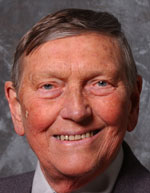 Bernard J. Lammers
Bernard J. Lammers
Government
Named Emeritus: 2005
Lives in: Canton, New York
“My best memory is of vital interaction with students.”
“Believe it or not,” says Bernie Lammers, whose full title is professor emeritus of public law and government, “my best memory is of vital interaction with students in the classroom.” From his home on University Avenue, across the street from campus and in the midst of several University-owned houses, he says “My main civic project right now is joint work with (Emeritus Professor of Economics) Wendell Brown on the corporate personhood problem.” Ever the teacher, he adds, “Anyone who is not fully informed about this can get onto the ‘Net and obtain information from Ultimate Civics, the Campaign to Legalize Democracy and MovetoAmend.org.” --NSB
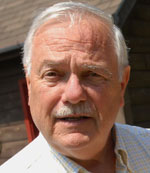 Theodore C. Linn
Theodore C. Linn
Chaplain
Named Emeritus: 2000
Lives in: Canton, New York
“Experiencing life through the eyes of our grandchildren.”
Chaplain Emeritus Ted Linn appreciates the faculty collegiality and student drive to learn at St. Lawrence. Directing the London program in 1994-1995 was the highlight of his career. “Students did in one semester what we hope four years of living and learning at St. Lawrence will accomplish,” he says. “It was the most rewarding experience with students in my 43 years of teaching.”
Linn also liked the fact that “the faculty see each other as resources as opposed to competitors and have a strong sense of teamwork.” He teaches courses for SOAR; has been active with Raquette Valley Habitat for Humanity, including a term as president; is a docent at the Frederic Remington Art Museum in Ogdensburg; monitors a trail of nesting boxes for the New York State Blue Bird Society; and, with his wife, Carol, volunteers at the Natural History Museum of the Adirondacks (“the Wild Center”) in Tupper Lake.
As if that weren’t enough to keep him occupied, you may find him on the tennis courts at SLU. His enthusiasm about many different activities keeps him busy, but he also says “I am enjoying experiencing life through the eyes of our six grandchildren.” --Josh Johnson ’10
 George F. McFarland
George F. McFarland
English
Named Craig Professor Emeritus: 1986
Lives in: Canton, New York
“...good moments in the classroom...”
“It was an exciting adventure to find that so much had gone unnoticed,” says George McFarland, explaining how it felt to retire from teaching and turn to local history, editing the St. Lawrence County Historical Association’s Quarterly. That work led him to Sally James Farnham, a nationally acclaimed sculptor who grew up in Ogdensburg, an artist who Frederic Remington admired. McFarland completed a first draft of a biography of Farnham before failing eyesight forced him to stop the work.
"There were so many good moments in the classroom,” McFarland says, but he focuses on a particular incident. One day the students in his upper-level class on the English Romantic poets seemed unusually quiet. He picks up the story: “When the bell was about to ring, I closed my book of Byron with a slam and said, ‘Well, I don’t know what’s wrong with you, but I really had a good time reading Byron.’”
Immediately, the students protested, saying they liked Byron too. In fact, they thought he was great, McFarland says. McFarland was pleased, having realized that quiet students can also be engaged students. --Betsy Kepes
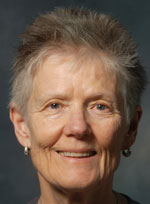 Celia K. Nyamweru
Celia K. Nyamweru
Anthropology / African Studies
Named Emerita: 2009
Lives in: Canton, New York
“Auditing classes in Mohawk.”
Celia Nyamweru got the most out of her career at St. Lawrence, both intellectually and personally. She shifted fields from physical geography to cultural anthropology and was able to complete research on a wide range of topics along the way. She edited a book and guest-edited a special issue of a journal, both on natural sacred sites. She also focused research on Native Americans and how their history and culture compare with those of African indigenous groups.
Nyamweru remembers a day with her students during the spring semester. Introduction to African Studies: Environment and Culture, which focused on water in Africa, also looked at water in the North Country. “For the last class we took canoes out on the Little River, paddled upstream for about 10 minutes and the students presented the results of research they had done about water issues in the North Country,” she says. “Then we paddled back down to the Canoe Shack, and that was the end of the course. It was great to sit out on a North Country river and talk about rivers,” she recalls.
Following retirement, Nyamweru has taught as an adjunct faculty member in the First-Year Seminar program. She will teach a course with Community-Based Learning next fall; it will take students to schools and youth groups at the Mohawk Reservation at Akwesasne. “I have been spending quite a lot of time there and have been auditing classes in Mohawk taught at SUNY Potsdam,” she notes.
Nor is this summer a time off. She has been in Kenya to teach a three-week field course, Pastoral Nomads and Wildlife Conservation, as part of the SLU Summerterm.
--Nora Wolinsky ’10
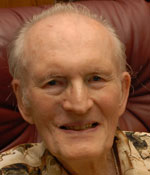 Daniel W. O’Connor
Daniel W. O’Connor
Religious Studies and Classical Languages
Named Dana Professor Emeritus: 1989
Lives in: Canton, New York
“I loved my teaching.”
“I loved my teaching at St. Lawrence. I never felt so alive, so with the world,” Dan O’Connor says. He treasures the cards, letters and e-mails that former students send him, notes that tell how his classes changed the direction of their lives. He cites one: after Susan Talve ’82 worked with O’Connor at an archaeological dig in north Israel near the Lebanese border, she decided to major in religious studies and subsequently became a rabbi, one of the first women to be accorded that distinction.
O’Connor’s retirement didn’t put a stop to his teaching. For years he led Elderhostel groups in the Middle East, focusing on his specialty of Biblical archaeology. Now he stays closer to home, teaching SOAR classes to other retirees on Comparative Religions and Islam. He wants people to know that it is “only the less important aspects that are different” in each religion.
Carved birds line a long shelf in O’Connor’s Canton home adjacent to campus, another retirement project. He’s carved 63 birds, elegant creations of wood and paint. His indigo bunting is on display at the Remington Museum in Ogdensburg. He studies with a master carver in Brockville, Ontario, and says each bird takes 50 to 100 hours to complete.
Ever committed to learning, at age 85 O’Connor began piano lessons. He’s hopeful he’ll have time to polish his new skills; after all, his Irish grandfather lived to a hearty and healthy 102.
--Betsy Kepes
 Richard J. Perry
Richard J. Perry
Anthropology
Named Emeritus: 2004
Lives in: Potsdam, New York
“I have no plans to do anything in opera.”
Professor Perry says that teaching at St. Lawrence was most valuable because it pushed him out of his comfort zone. Not an extrovert by nature, Perry says he learned to love being in front of a classroom and misses it now.
He remembers most vividly “those moments of euphoria in the classroom when something seemed to work out just right, and those others, equally inexplicable to me, when it didn’t.” Overall, he says, “the moments that seem best and most valuable were those when I had a chance to talk to a student individually, to work out some problem, to help devise a plan, or maybe just help alleviate some anxiety.”
In retirement, Perry has been honing his cooking skills, improving his gardening and doing some house work. He says he is happy because “As an emeritus they still allow you in the library. I wrote another book after retiring, “Race” and Racism: The Development of Modern Racism in America.” He thanks his wife, his anthropology colleague Alice Pomponio, and her Fulbright in Siena, Italy, for allowing them to spend a considerable amount of time in that country. He enjoys working on his Italian and points out that “I can now approximate a proper Tuscan dialect at the level of a 4- or 5-year-old. I have no plans, however, to do anything in opera.” --Josh Johnson ’10
 William D. Romey
William D. Romey
Geography
Named Emeritus: 1993
Lives in: East Orleans, Mass.
“My favorite memories involve field work.”
Retirement has been anything but sedentary for Bill Romey. To wit:
*He and his artist wife, Lucretia, have taught in the Semester at Sea Program.
*From 1993 through 2006 he spent about three months a year aboard ships traveling the Atlantic and Pacific Oceans and the Mediterranean, South China and Black Seas – “among others,” he says.
*He lectured on geology and geography and led field trips on two dozen exploration cruises in the Antarctic, aboard several different expedition ships.
*He lectured and led numerous trips around “the British Isles, the Hebrides, the Scandinavian and Russian coasts, Svalbard in the high Arctic, and the length of the Atlantic, from the Arctic to the Carribbean to the Antarctic.”
*He worked (he puts “work” in quotes) on cruise ships on the St. Lawrence River, around Canada's Atlantic Provinces, and on the Hudson River and Erie Canal.
*He lectured on every Cunard liner and on many Royal Caribbean, Princess and Norwegian Line cruise ships.
“Obviously the years since I left St. Lawrence are fulfilling what has to be a geologist-geographer's dream,” he says. He’s “busy preparing e-books describing those adventures and including lots of photographs.” The books are available as CD-ROMs; interested parties can contact him at romeywd@comcast.net.
“My favorite memories of teaching at St. Lawrence involve all the field work I was able to do with students,” he says. He lists the program in France, which he directed in 1991-92; Interterms in Iceland, the Azores and Madeira, Greece, Kenya, Hawaii and Alaska; and “other shorter field trips in the Northeast and to California. Several of these involved collaboration with other faculty, as did my three years of teaching in the Freshman [now First-Year] Program,” he says. “Team teaching was really the most fun.”
These days, Romey continues to make daily measurements of water temperature and salinity near his home, adding to a data base he began in 1979; gives lectures locally on these shore-line studies; and is “busy working some of this material up for publication.” He also continues attending the meetings of several geological and geographical societies. Clearly, he has not slowed down very much. --NSB
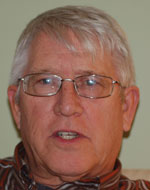 Samuel S. Stradling
Samuel S. Stradling
Chemistry
Named Baker Professor Emeritus: 1999
Lives in: Hamilton, New York
Testing new varieties of onions, spinach and beans.
“I am a product of a liberal arts and sciences education and continue to argue that as the best approach to education at the college level,” says this Hamilton College alumnus. He says the most rewarding aspect of 36 years of teaching “was a recurring one: the success of the students. Admittance into a desired graduate program or professional school, securing a great job opportunity, garnering a college or departmental award, or simply performing at a high level on an examination, research project, paper or whatever the student had undertaken brought satisfaction.”
He also recalls “the support and encouragement that I received to explore and experiment with how I went about my teaching. I felt complete freedom to examine what I considered creative ways to approach the delivery of subject matter,” he says. “For my many years in the First-Year Program, the flexibility to manipulate and experiment with both pedagogy and subject matter was most enjoyable and rewarding.”
Stradling divides his retirement activities into three groupings:
*Travel, so as to “spend considerable time with family and friends” and visit “most of Europe from the British Isles through Eastern Europe and a few locations in the southern U.S.”
*Leisure activities:
--Tennis, including annual visits to the New York State Senior Games for doubles, where he and his partner have won a state championship;
--“Considerable time in the vegetable patch,” where he has tested new varieties of onions, spinach and bush beans for a seed company;
--“After a 40-year hiatus, back to competitive duplicate bridge.”
*Volunteer work, ranging from the boards of the hospital auxiliary, the Hamilton Public Library and Cornell Cooperative Extension of Madison County, to umpiring recreational girls’ softball, to the Hamilton Food Cupboard and the Retired Senior Volunteer Program. Stradling, who chairs the board of the Food Cupboard, explains, “We have secured grants to purchase fresh produce from local farmers and distribute it at no cost to several hundred patrons.”
He’s also been an IRS certified tax counselor for 10 years. “Through Tax Counseling for the Elderly, I prepare and electronically submit free tax returns for seniors,” he says. --NSB
About Our Writers
Nora Wolinsky and Josh Johnson, of St. Albans, Vt., and Bemus Point, N.Y., respectively, were senior writing interns in the University communications office in spring 2010; Neal Burdick ’72 has been editor of this magazine for 33 years, and took courses from some of the emeriti profiled here; Betsy Kepes is a freelance writer and music teacher who lives in Pierrepont, N.Y.

